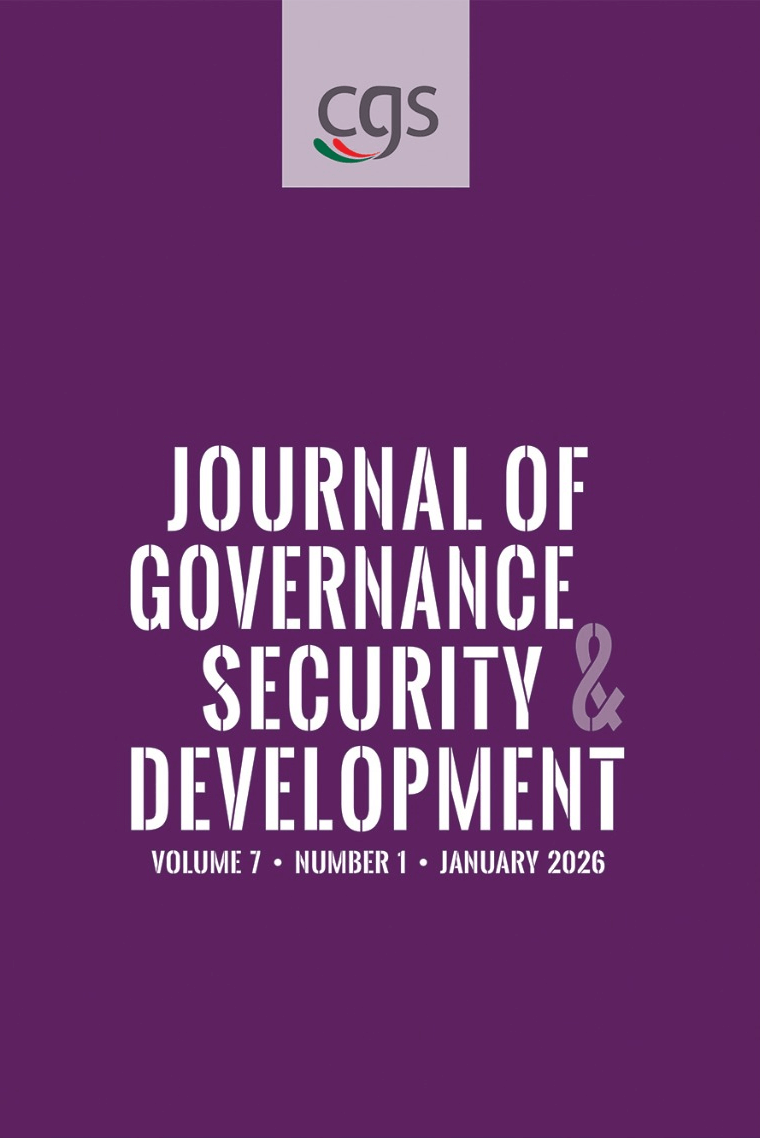Publication Ethics Policy
Publication Ethics Policy
The Journal of Governance, Security, and Development (JGS&D) is committed to upholding the highest standards of publication ethics. The following guidelines outline the ethical responsibilities of authors, reviewers, and editors involved in the publication process:
Authors' Responsibilities
Originality and Plagiarism: Authors must ensure that their work is original and has not been previously published or submitted elsewhere. Proper acknowledgment and citation of the work of others must be provided. Plagiarism in any form is unacceptable.
Data and Results Integrity
Authors should present accurate and reliable data, ensuring the integrity of the research process and the transparency of the results. Fabrication, falsification, or manipulation of data is strictly prohibited.
Authorship
Only individuals who have contributed significantly to the research should be listed as authors. All authors should have reviewed and approved the final version of the manuscript and agreed to its submission for publication.
Conflicts of Interest
Authors must disclose any conflicts of interest that could influence the interpretation of their research findings or the evaluation of their work.
Proper acknowledgment of the work of others should be provided. Authors should cite and reference all relevant sources used in their research.
Plagiarism Policy
The Journal of Governance, Security, and Development (JGS&D) maintains a strict policy against plagiarism. Plagiarism is defined as the use of someone else's work, ideas, or words without proper acknowledgment and attribution. JGS&D considers plagiarism a serious ethical violation and is committed to detecting and addressing any instances of plagiarism in submitted manuscripts. The following guidelines outline the Journal's plagiarism policy:
Originality of Work
Authors must ensure that their work is original and has not been previously published or submitted elsewhere.
Proper acknowledgment and citation of the work of others must be provided. Authors should clearly indicate and attribute all sources used in their research.
Plagiarism Detection
All manuscripts submitted to JGS&D are subjected to rigorous plagiarism detection using reliable software tools.
The plagiarism detection process includes a thorough examination of the manuscript's text, references, and citations to identify any instances of plagiarism.
Types of Plagiarism:
Copying: Directly copying text, sentences, or paragraphs from another source without proper citation or quotation marks.
Paraphrasing: Restating someone else's work or ideas without proper attribution or citation.
Self-Plagiarism: Reusing significant portions of one's own previously published work without proper acknowledgment.
Plagiarism Consequences:
If plagiarism is detected in a submitted manuscript, the following actions may be taken:
Rejection: The manuscript may be rejected without further consideration for publication.
Revision: The author may be asked to revise the manuscript to address the plagiarism concerns.
Retraction: If plagiarism is discovered after publication, the article may be retracted from the Journal with a formal notice and explanation.
Reporting: Serious cases of plagiarism may be reported to the author's institution, funding agencies, or relevant professional organizations.
Prevention and Awareness:
Authors are strongly advised to familiarize themselves with proper citation practices and to ensure that all sources are accurately cited and referenced.
JGS&D encourages authors to use plagiarism detection software to check their manuscripts for potential plagiarism before submission.
The Journal provides clear guidelines on citation styles and referencing formats to assist authors in adhering to proper academic practices.
Peer Review:
Reviewers and editors play a vital role in identifying and reporting any suspected cases of plagiarism. Reviewers are encouraged to be vigilant in detecting plagiarism during the review process and to report any concerns to the editor. The Journal of Governance, Security, and Development (JGS&D) is committed to upholding the highest standards of academic integrity. By maintaining a solid plagiarism policy, the Journal ensures the originality and credibility of the research published within its pages.


